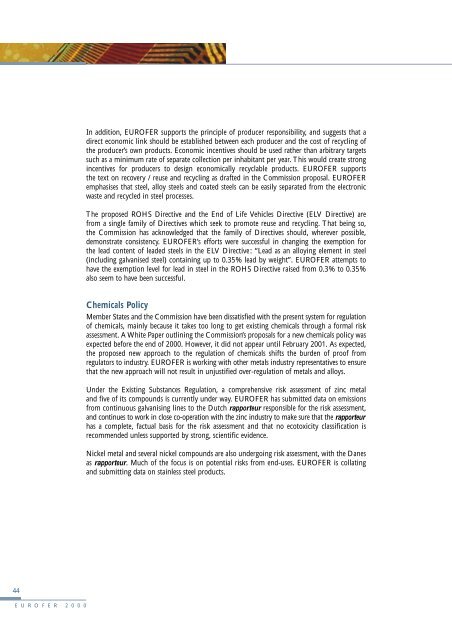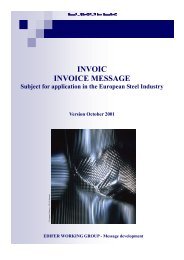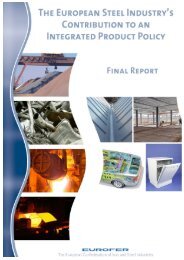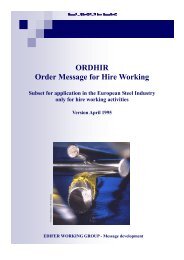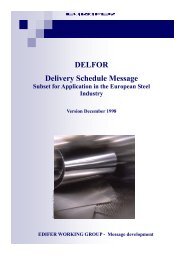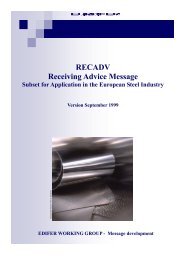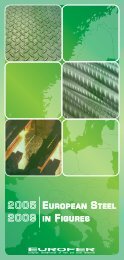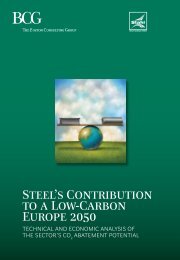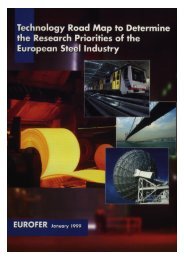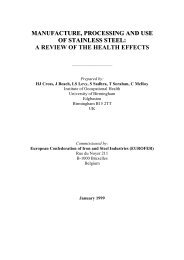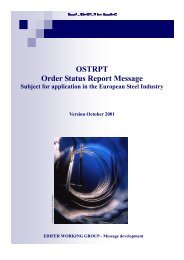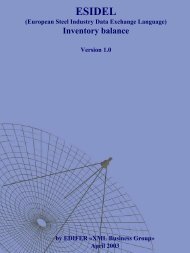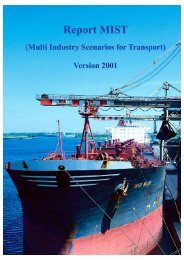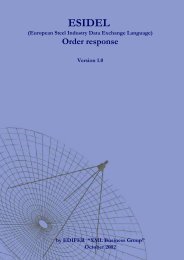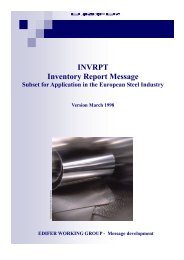Imports - Eurofer
Imports - Eurofer
Imports - Eurofer
You also want an ePaper? Increase the reach of your titles
YUMPU automatically turns print PDFs into web optimized ePapers that Google loves.
44<br />
E U R O F E R 2 0 0 0<br />
In addition, EUROFER supports the principle of producer responsibility, and suggests that a<br />
direct economic link should be established between each producer and the cost of recycling of<br />
the producer’s own products. Economic incentives should be used rather than arbitrary targets<br />
such as a minimum rate of separate collection per inhabitant per year. This would create strong<br />
incentives for producers to design economically recyclable products. EUROFER supports<br />
the text on recovery / reuse and recycling as drafted in the Commission proposal. EUROFER<br />
emphasises that steel, alloy steels and coated steels can be easily separated from the electronic<br />
waste and recycled in steel processes.<br />
The proposed ROHS Directive and the End of Life Vehicles Directive (ELV Directive) are<br />
from a single family of Directives which seek to promote reuse and recycling. That being so,<br />
the Commission has acknowledged that the family of Directives should, wherever possible,<br />
demonstrate consistency. EUROFER’s efforts were successful in changing the exemption for<br />
the lead content of leaded steels in the ELV Directive: “Lead as an alloying element in steel<br />
(including galvanised steel) containing up to 0.35% lead by weight”. EUROFER attempts to<br />
have the exemption level for lead in steel in the ROHS Directive raised from 0.3% to 0.35%<br />
also seem to have been successful.<br />
Chemicals Policy<br />
Member States and the Commission have been dissatisfied with the present system for regulation<br />
of chemicals, mainly because it takes too long to get existing chemicals through a formal risk<br />
assessment. A White Paper outlining the Commission’s proposals for a new chemicals policy was<br />
expected before the end of 2000. However, it did not appear until February 2001. As expected,<br />
the proposed new approach to the regulation of chemicals shifts the burden of proof from<br />
regulators to industry. EUROFER is working with other metals industry representatives to ensure<br />
that the new approach will not result in unjustified over-regulation of metals and alloys.<br />
Under the Existing Substances Regulation, a comprehensive risk assessment of zinc metal<br />
and five of its compounds is currently under way. EUROFER has submitted data on emissions<br />
from continuous galvanising lines to the Dutch rapporteur responsible for the risk assessment,<br />
and continues to work in close co-operation with the zinc industry to make sure that the rapporteur<br />
has a complete, factual basis for the risk assessment and that no ecotoxicity classification is<br />
recommended unless supported by strong, scientific evidence.<br />
Nickel metal and several nickel compounds are also undergoing risk assessment, with the Danes<br />
as rapporteur. Much of the focus is on potential risks from end-uses. EUROFER is collating<br />
and submitting data on stainless steel products.


